Eggs usually last a long time, but it has been a long debated topic where the best place to store them is in your kitchen.
It’s an ongoing debate whether storing eggs on the countertop or inside the fridge will keep them fresher for much longer. It is common in Britain to keep your eggs on the countertop, but Americans are much more likely to keep them in the fridge.
However, Dr Bolueso, a British vet, has said you don’t “necessarily” have to keep eggs in the fridge, but his experience working with food inspectors while studying for his doctorate has given him a unique perspective on this food storage debate.
In a video online, Dr Bolueso said: “Part of being a vet is part of being responsible for animals from the farm right onto the dinner plate right? Part of my course was actually food standards, and actually food hygiene.
“In my last year of university, I actually had to go around inspecting restaurants with a food hygiene inspector telling him what is wrong and what is right with the way in which they’re processing food but also the way in which they’re storing food.”
Where should you store your eggs?
Dr Bolueso believes eggs should be stored in the fridge due to the constant temperature, which gives them greater longevity.
He said: “You don’t need to store your eggs inside the fridge, but you can leave it in the fridge to last longer. Also, I bet you didn’t know this, [but] if you leave your eggs in the fridge, they’ll probably last a lot longer than if you leave them out.”
However, Dr Bolueso also explained that supermarkets do not refrigerate their eggs because they would condense due to the change in temperature. He said: “There’d be some condensation on there, [and] that would increase the risk of you getting salmonella poisoning later on when you eat the egg.”
If you wish to get the best quality eggs then Dr Bolueso recommends looking for a British Lion quality stamp, which will look like a red lion wearing a crown. He explained: “That shows that the chickens have actually been vaccinated against salmonella so that’s something to look out for. Either it’s inside the box or it’s on the egg itself.”
Don’t miss…
Keep pumpkins fresh and colourful for up to two months – how to store them[REVEAL ]
Keep garlic fresh for up to six months by keeping it stored outside the fridge[INSIGHT ]
Bananas will stay yellow and fresh with this ‘really easy’ food storage method[LATEST]
- Advert-free experience without interruptions.
- Rocket-fast speedy loading pages.
- Exclusive & Unlimited access to all our content.
According to British Lion Eggs, eggs should always be kept at a cool steady temperature, which means they can be kept either on the countertop or fridge as long as they keep the same temperature and are not somewhere too hot or too cold. However, they are more likely to stay fresher for longer in the fridge.
However, this means that if you do store them in the fridge, do not put them in the fridge door. The constant change in temperature of the fridge opening and closing can make the eggs not fit for consumption.
On their website, British Lion Eggs writes: “To the million dollar question: should you store your eggs in the fridge or keep them in the cupboard? For optimum quality and safety, you want to make sure your eggs are kept at a steady temperature below 20’C, so try to avoid moving them too often between very cold and very warm temperatures such as between a hot car and fridge, or fridge and hot kitchen”
They added: “Best practice is to store eggs in the fridge; that way the temperature is always at a constant and your eggs will be fresher! When you do get around to using them, try to leave the eggs out of the fridge for around 30 minutes to bring them up to room temperature, otherwise cooking times could change depending on how you’re using them.”
However, no matter where you land on the countertop or fridge debate, make sure to always keep your eggs in the carton they came in. Dr Bolueso said: “Another way to keep your eggs [fresh], make sure you keep them in the carton, that way you have no hygiene issues.”
Follow Daily Express US on Facebook and Twitter @ExpressUSNew
Source: Read Full Article



